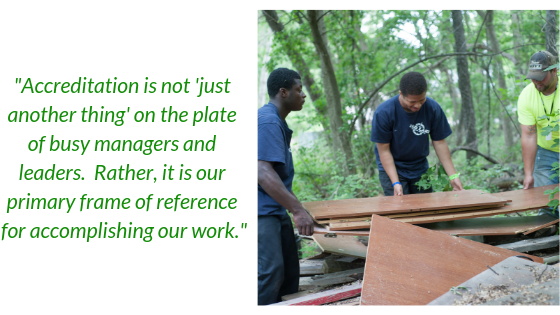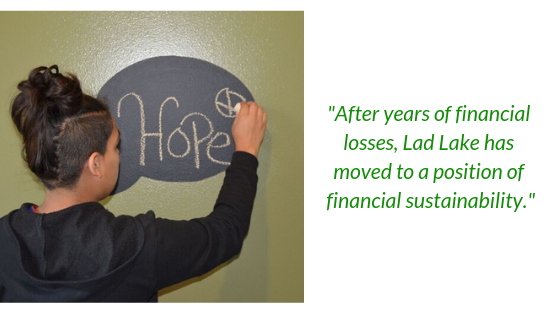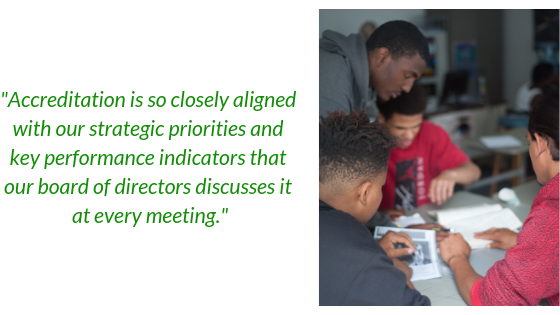Profiles in Accreditation: Lad Lake
Welcome to the first in a new series of blog posts entitled Profiles in Accreditation!
The organizations that COA accredits are diverse in both the communities they serve and their reasons for seeking accreditation (or reaccreditation). Profiles in Accreditation will explore the accreditation experience through the perspective of these organizations. Through them, we can discover the value of accreditation, best practices, lessons learned, and recommendations.
Organization profile
Name: Lad Lake
Locations: Milwaukee and Dousman, Wisconsin
First Accredited: 2014
Reaccredited: 2018
Snapshot: Lad Lake has been evolving to meet the needs of Wisconsin’s most vulnerable children for 170 years. Serving more than 1,200 youth annually, the organization’s 300 staff accomplish its mission of “guiding the growth of at-risk youth to reach their potential and live responsibly” through four major program commitments: two residential care centers for youth who have experienced trauma from the child welfare and juvenile justice systems; alternative education for students with special learning needs; independent living services for youth “aging out” of the foster care system; and community services such as in-home therapy, specialized mentoring, and supervised visitation for parents and children.
Interview with Lad Lake
For our first Profiles in Accreditation post, we asked Lad Lake President and CEO Daniel O. Magnuson, MA, MSW to share his thoughts on his organization’s journey through reaccreditation. He emphasized how accreditation provided a framework for operational success, as well as the importance of having the entire organization–including the board–engaged with the process.
COA: Why was it important to Lad Lake to seek accreditation initially?
DM: We sought our initial accreditation in preparation for the retirement of a long-serving CEO; we wanted to position Lad Lake for improved impact and financial sustainability.
COA: What were some of the drivers for seeking reaccreditation?
DM: As we implemented the initial accreditation plan in 2014-2015, we also completed a comprehensive strategic planning initiative. COA’s accreditation framework helped us to focus and look at activities on an organizational level, which made the execution of our strategic plan more effective. Reaccreditation affirmed our internal sense that we were making significant progress in all domains of our performance, and in a dramatic fashion!
Additionally, accreditation provides Lad Lake with a competitive advantage with many of our stakeholders. This will be increasingly important as the federal Families First Prevention Services Act is implemented.

COA: What about the COA accreditation process made you decide to partner with us?
DM: Our partnership with the Alliance for Strong Families and Communities and our executive leadership’s deep connection with the Alliance network made COA the obvious choice for accreditation. It is the “gold standard” for our industry.
COA: What do you see as the main benefit of COA accreditation?
DM: COA accreditation provides Lad Lake with a framework for (and the discipline to stay focused on) our strategic priorities. It helps us to learn together, to adjust our approaches to achieve our intended impact, and to strengthen our financial sustainability in the face of changing market conditions.
COA: Were there any unexpected results after completing the Self Study and PQI process?
DM: The primary unexpected result was the degree to which Lad Lake’s management teams embraced COA accreditation, especially reaccreditation. The standards, the policies, and the procedures developed in our self-study and PQI processes have, for the most part, become the way Lad Lake does business. Accreditation is not “just another thing” on the plate of busy managers and leaders. Rather, it is our primary frame of reference for accomplishing our work.
Additionally, the COA accreditation and reaccreditation processes were completed in the face of very serious financial challenges. These challenges required the development and execution of a difficult turnaround plan. Rather than distracting our leadership from that plan, COA accreditation provided a disciplined process to focus our attention on the key drivers for our success.
As CEO, I do not believe our financial turnaround, improved quality and financial sustainability could have been possible without the discipline of thought offered by accreditation and reaccreditation.

COA: Why was it important for you to have a high level of stakeholder engagement across your organization?
DM: One element of our organizational vision is to fulfill our mission with an “aligned, engaged, and happy workforce.” This can be a tall order in an industry with such challenging work and shoe-string budgets! The COA process, in concert with a clear strategic plan, helped us to articulate what we wanted employees to align and engage with. It also helped us to communicate those directions across our organization. This has grounded Lad Lake’s daily activities in a larger vision of improving the lives of youth and families in need.
COA: How has COA accreditation/reaccreditation impacted operational success at Lad Lake?
DM: Accreditation and reaccreditation has been transformative for Lad Lake. In concert with our updated strategic plan, COA provided a framework to operationalize and monitor our process improvements across all domains of our organization, from impact to human capital to financial sustainability to governance. A host of key performance indicators focused the work of the board, management, and staff.
The results have been extraordinary. All our programs now share common goals in safety, health, social support, and hopeful futures. Process improvement is closely tracked with client feedback and validated assessment methodologies. Findings inform refinements in program design. Risk management in many key areas has dramatically improved. After years of financial losses, Lad Lake has moved to a position of financial sustainability.

COA: How did you communicate the value of accreditation and engage the entire organization during the accreditation process?
DM: We did so in various ways. Firstly, many managers and supervisors were (and are still) involved in various teams devoted to quality improvement and risk management. Internal communication methods such as staff newsletters, email communication, and face-to-face meetings helped to extend the accreditation story to team members. Accreditation at Lad Lake is so closely aligned with our strategic priorities and key performance indicators that our board of directors discusses it at every meeting.
COA: At the board level, what were the driving factors for seeking accreditation?
DM: The board was particularly interested in accreditation to help it better understand and address the impact of the organization’s services on youth and families. The pending retirement of a CEO and the prospect of a new CEO coming aboard added extra urgency to Lad Lake’s initial pursuit of it.
COA: What was the biggest challenge for the board during the accreditation process?
DM: The board fully embraced accreditation. They understood its value and likened the process to quality initiatives and accreditation in their respective industries. Linking accreditation to our strategic planning and turnaround agenda required careful attention, but accreditation helped, not hindered, that process.
COA: What are the top three tips that you would give to an organization considering or currently undertaking the accreditation process for the first time?
DM: I would advise organizations to:
1. Embrace accreditation as the way you do business, not as an extra initiative to take on.
2. Embrace strategic planning. Find the right strategic planning process for you, and closely link accreditation with your strategic plan.
3. Communicate and engage your board of directors with COA. Many parallels may exist in their industries (e.g., Six Sigma, ISO 9001, Joint Commission, etc.).
Thank you, Lad Lake!
We would like to thank Dan for his thoughtful insights into the accreditation process and acknowledge the entire board and team for embracing accreditation and collectively contributing to the continued success of Lad Lake.
Do you have an accreditation story to tell?
Click here to tell us about it.
You could be the next organization we feature!



